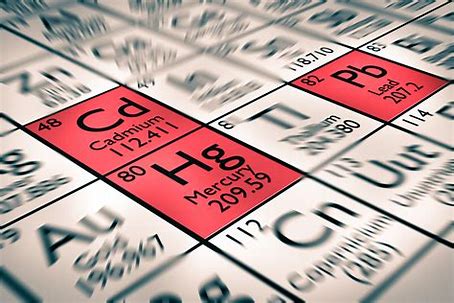Just Because It's Natural, Doesn't Mean It's Healthy

Heavy Metal....friend or foe?

Have you ever heard of heavy metals? Not the type of music (which is what may come up when you Google it). Instead, heavy metals are a group of elements with metallic properties. These metals are a natural part of the earth and are even necessary for life in small amounts. Some of them, such as iron, copper, and zinc are essential nutrients for the human body. However, human activities have altered the biochemical balance of heavy metals. Additionally, they are toxic to the human body in certain amounts. We come into contact with these toxic heavy metals daily as they are now used in many personal care products, furniture, agriculture, dental fillings, medications, vaccinations and in other ways. Because the body is "overloaded" with toxins in today's world, it cannot easily get rid of heavy metals and other toxins. Genetics and our diets also affect the body's ability to detox. Some signs that your body may not be detoxing properly are fatigue, headaches, brain fog, sleep issues, and weight problems. Thus, these heavy metals easily build up and affect the body. There are over 20 heavy metals and each of them affect the body in a different way.
In general, heavy metals affect the human body in two ways. They either act as another element in the body thus interfering with the balance of elements in the body, or they directly interfere with metabolic processes. Some heavy metals can be eliminated from the body but most build up and deposit in the body, causing chronic problems. In fact, “one of the most common causes of psychiatric problems (of which medical doctors are unaware) is heavy metal toxicity.” (Dr. Simon Yu, M.D. author of Accidental Cure) A few of the most common heavy metals are aluminum, mercury, lead, nickel, and copper.
The most abundant heavy metal on this planet is aluminum. It is in the soil, air, food, and water. In low amounts, such as naturally in the soil, aluminum does not harm the body. However, aluminum is added to public water and used in cans, tooth fillings, toothpaste, makeup, deodorant, and pesticides. With so many sources that we are exposed to it now, aluminum can build up and cause chronic issues. Aluminum toxicity greatly affects the brain and nervous system. It can cause fatigue, cognitive impairment, speech impairments, and seizures. In studies of Alzheimer's disease, aluminum was found in high amounts in the brains of these patients. Aluminum also affects the bones and can cause fractures, bone diseases, and bone pain.
Mercury is commonly known as being toxic to the human body because of thermometers that use mercury. Despite this, mercury is still used in dental fillings, medications, florescent bulbs, jewelry, and vaccines. Mercury generally affects the brain, lungs, and kidneys. Mercury toxicity can cause brain damage, tremors, and gingivitis. Pregnant women and fetuses are even more at risk for mercury toxicity. It can keep the fetus from developing properly and even cause spontaneous abortion. Mercury can also cause less obvious, although at times more chronic symptoms, such as weakness, fatigue, and a suppressed immune system.
"In children, [lead] impairs brain development and reduces IQ."
Lead is toxic to the human body, even in small amounts. It acts as some minerals, such as calcium, and interacts with proteins to disrupt biological processes. In children, it impairs brain development and reduces IQ. [Richard L. Canfield, Ph.D. New England Journal of Medicine 2002]. Lead easily crosses the blood-brain barrier so it affects the brain and has been linked to dementia and brain cancer. Symptoms of lead toxicity may include irritability, loss of appetite, headaches, concentration problems, fatigue, joint and muscle pain, and more. It can also cause infertility, premature births, and miscarriages. Lead, like most other heavy metals, can be passed from mother to child in the womb and cause problems for the baby.
Lead is naturally found in the earth's crust but has been released more into the environment due to mining, burning, and manufacturing. It is used in paint, pipes, medications, and even cosmetics. It is also found in our drinking water due to the lead pipes used to carry it. There have been efforts made in recent years to reduce lead in paint and industrial products, however, it is still a large problem.
Copper
Copper is a metal that is used by the body in small amounts. However, it can build up in excess and store itself in the liver, brain, and other places in the body. It then causes oxidative stress and DNA damage. Not all copper is the same. For example, the copper that we get from foods, such as meats and seafood, is different than the copper sprayed on crops. Copper toxicity is becoming more common. Birth control pills, vegetarian diets, and copper piping are factors that have grown copper toxicity.
There is a large range of symptoms associated with copper toxicity. These include but are not limited to nausea, panic attacks, chocolate cravings, anxiety and depression, Alzheimer's, insomnia, constipation, infertility, cancer, joint pain, ADD and headaches. Copper toxicity, oddly enough, also tends to cause copper deficiency, therefore individuals may experience fatigue, candida, and brain fog. This metal can be detoxed in much the same way as those previously and one can follow the same recommendations for ensuring the detox system is working properly.
Although heavy metals are natural, there are many heavy metals found on earth that, when not eliminated from the body, can negatively affect the human body.
"Even low amounts of heavy metals can be harmful." according to Ellen Silbergeld, Ph.D., a professor at John Hopkins University.
Not all of these heavy metal sources are avoidable. Therefore, we muse ensure that our detoxification system is working properly.
RTKC can help rid the body of these built-up toxins and get the body's detoxification system back in working order.


